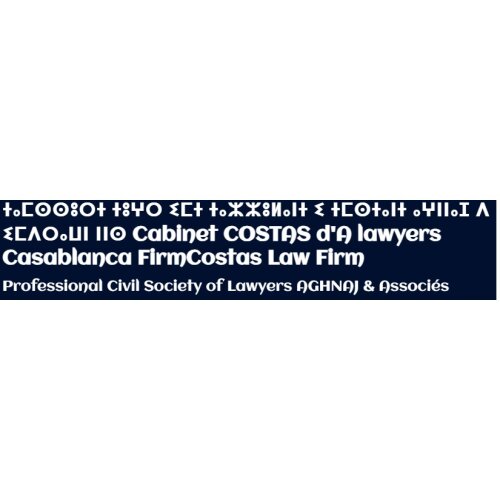Best Cannabis Law Lawyers in Morocco
Share your needs with us, get contacted by law firms.
Free. Takes 2 min.
Or refine your search by selecting a city:
List of the best lawyers in Morocco
About Cannabis Law in Morocco
Morocco has a long history of cannabis cultivation, especially in the northern regions like the Rif Mountains. The plant has been an integral part of the local economy and culture for centuries. While Morocco is one of the largest producers of cannabis resin (hashish) globally, its legal status has been a complex issue. Until recently, cannabis was mainly illegal, with stringent laws against its cultivation, possession, and trafficking. However, in 2021, Morocco legalized the medical and industrial use of cannabis, shifting significantly in its approach to cannabis regulation. Nevertheless, recreational use remains illegal, and strict penalties can still apply to unauthorized activities.
Why You May Need a Lawyer
Given the evolving nature of cannabis laws in Morocco, various situations might necessitate legal assistance. Here are some common situations:
- Medical/Industrial Licensing: Navigating the process of obtaining licenses for legal cultivation or production of cannabis for medical or industrial purposes.
- Possession Charges: Being charged with the illegal possession of cannabis, which could carry severe penalties.
- Business Operations: Setting up a business related to the legal cannabis industry requires adherence to complex regulatory frameworks.
- Legal Compliance: Ensuring that operations comply with national and regional cannabis laws, avoiding potential legal pitfalls.
- International Trade Issues: Engaging in the legal export of cannabis products often involves international law and trade regulations.
Local Laws Overview
Morocco's legal landscape regarding cannabis is evolving, particularly after the decision to permit medical and industrial cannabis use. Key aspects include:
- Medical and Industrial Use Legalization: Enables the cultivation and production of cannabis under strict government regulation for medical and industrial purposes.
- Recreational Use: Remains illegal, with harsh penalties for unauthorized possession, use, and sale.
- Licensing Requirements: Farmers and companies must obtain licenses to legally grow and process cannabis for eligible uses.
- Regulatory Bodies: The government has designated specific bodies to oversee the legal cannabis market, ensuring compliance with the law.
- Geographical Limitations: Legal cultivation is mainly limited to certain regions, traditionally involved in cannabis farming.
Frequently Asked Questions
1. Is cannabis legal in Morocco?
Cannabis for recreational use is illegal. Only medical and industrial uses are permitted under strict licensing conditions.
2. What are the penalties for illegal cannabis possession?
Penalties can be severe, including imprisonment and heavy fines, depending on the quantity and intent.
3. How can I legally cultivate cannabis in Morocco?
You must apply for and obtain a specific license from the government, which is only available for medical and industrial purposes.
4. Are foreigners allowed to participate in Morocco's cannabis industry?
Yes, but they must comply with local laws and may need to partner with local businesses or individuals to operate legally.
5. What is the role of the Moroccan government in cannabis regulation?
The government regulates the industry via designated agencies that issue licenses and monitor compliance.
6. Can tourists consume cannabis in Morocco?
No, recreational cannabis use is prohibited, and being caught can result in legal consequences.
7. What are the key requirements for obtaining a cannabis license?
Applicants must meet specific criteria, including geographic limitations, intent for use, and compliance records.
8. Is it possible to export cannabis products from Morocco?
Only under the conditions that align with international trade laws and regulations. Proper channels and licenses are necessary.
9. How has cannabis legalization affected Morocco's economy?
It aims to boost the economy by providing new legal economic opportunities and turning illicit operations into tax-paying businesses.
10. What impact has legalization had on public health and safety?
The impact is still being assessed, but legalization for medical purposes is aimed at providing safe, controlled access to cannabis-derived products.
Additional Resources
For further information and support related to cannabis laws in Morocco, the following resources may be helpful:
- National Agency for the Regulation of Cannabis Activities: The primary regulatory body overseeing legal cannabis activities.
- Legal Firms Specializing in Cannabis Law: Various legal firms can assist with licensing and compliance matters.
- Ministry of Health: Provides information on the medical application of cannabis products.
- Local Business Associations: Offer networking and support for cannabis-related businesses.
Next Steps
If you require legal assistance regarding cannabis in Morocco, consider the following steps:
- Consult a Lawyer: Seek a lawyer experienced in cannabis law and familiar with Moroccan regulations.
- Prepare Documentation: Gather all necessary documents to expedite the consultation and any potential legal processes.
- Understand the Laws: Educate yourself about current Moroccan cannabis laws to better understand your situation.
- Establish Local Contacts: Building a network with local professionals can provide insights and aid compliance.
- Stay Updated: Keep abreast of any changes in the legislation that may impact your legal standing or business operations.
Lawzana helps you find the best lawyers and law firms in Morocco through a curated and pre-screened list of qualified legal professionals. Our platform offers rankings and detailed profiles of attorneys and law firms, allowing you to compare based on practice areas, including Cannabis Law, experience, and client feedback.
Each profile includes a description of the firm's areas of practice, client reviews, team members and partners, year of establishment, spoken languages, office locations, contact information, social media presence, and any published articles or resources. Most firms on our platform speak English and are experienced in both local and international legal matters.
Get a quote from top-rated law firms in Morocco — quickly, securely, and without unnecessary hassle.
Disclaimer:
The information provided on this page is for general informational purposes only and does not constitute legal advice. While we strive to ensure the accuracy and relevance of the content, legal information may change over time, and interpretations of the law can vary. You should always consult with a qualified legal professional for advice specific to your situation.
We disclaim all liability for actions taken or not taken based on the content of this page. If you believe any information is incorrect or outdated, please contact us, and we will review and update it where appropriate.
Browse cannabis law law firms by city in Morocco
Refine your search by selecting a city.











